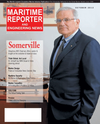
Page 18: of Maritime Reporter Magazine (October 2012)
Marine Design & Construction
Read this page in Pdf, Flash or Html5 edition of October 2012 Maritime Reporter Magazine
18Maritime Reporter & Engineering News Some years ago, I wrote an arti- cle lamenting the fraudulent en-tries made in many oil record books and the increasing use ofthose entries as signed confessions in theprosecution of ship owners and operators and senior shipboard personnel (particu- larly chief engineers) for making false statements to the US Coast Guard. Oilrecord books are required records oncommercial vessels and must be pre- sented to Coast Guard boarding officers on demand. The presentation of an oil record book with known false entries for the purpose of misleading the federal of-ficial into believing that the vessel is in compliance with applicable requirementscan subject the ship owner, operator, and senior shipboard personnel to significant penalties. Contrary to my expectations, the number of violations continues at ahigh rate, despite the prevalence of high- visibility convictions and imposition of severe penalties. Gradually, the prosecutions for making false statements have expanded beyond the oil record book scenario. Convic- tions have been obtained for false entries in garbage record books and ballast water management records. It is only a matterof time before we see convictions for false entries in air emission, hull hus- bandry (biofouling), and sewage man- agement records.For some unknown reason, neither the ship owners/operators nor senior ship- board personnel seem to get it. The United States government is serious about the accuracy of required shipping records and will not tolerate the present-ment of knowing false entries. Prosecu- tion for presentment of false records is a well-understood crime. It consists of five elements: (1) making a statement orallyor in writing; (2) when the statement isfalse or misleading; (3) the false or mis- leading information is material; (4) thestatement or concealment was made knowingly; and (5) the statement was made or presented to a federal official en- gaged in performance of his or her duty. Recently, though, the US government (particularly the Department of Justiceand the US Coast Guard) may have over- stepped the line. They are now some- times charging ship owners, operators, and senior shipboard personnel with fail- ure to maintain proper records. The major difference between this new crime and the older crime of making or pre-senting a false statement to a federal of- ficial is that the written statement no longer need be made or presented to afederal official. Thus, a false entry in a ship?s oil record book made two years previously involving a voyage in a far part of the world may subject the owner, operator, and senior shipboard personnel to criminal prosecution in the UnitedStates for each time the ship enters USwaters without regard for whether a Coast Guard boarding officer ever exam- ines the oil record book. No evidence that the fraudulent oil record book entryadversely impacted (or could possibly have adversely impacted) the United States is required. In addition, one fraud-ulent oil record book entry could result inmultiple violations of US law ? one vio- lation for each port call while the errantoil record book is on board the ship, even where there has been no USCG boarding.The use of shipboard records as signedconfessions even when unread by federal authorities now potentially extends be- yond the oil record book. Close exami- nation of the Code of FederalRegulations (CFR) reveals that similar language requiring the maintenance ofrecords is used in regulations relating to ballast water management and garbage management. The Environmental Pro- tection Agency (EPA), in its regulations relating to control of air emissions frommarine engines, uses the word ?keep? rather than the word ?maintain?. The im- pact may be the same. This raises the issue of semantics andoriginal intent. The oil record book pro- vision in Annex I to the International Convention for the Prevention of Pollu- tion from Ships (MARPOL Convention) provides that an entry shall be made in the oil record book on each of certain op-erations, including the discharge over- board of bilge water. It further provides that the oil record book shall be ?kept in such a place? on board as to be readilyavailable for inspection. In the United States, the MARPOLConvention is implemented and enforced via the Act to Prevention Pollution from Ships (APPS). The US Coast Guard (and for air emissions, the EPA) has promul- gated regulations regarding various pro- visions in the MARPOL Convention, including the oil record book provision. The initial USCG regulations promul- gated under APPS appeared in 1983. They provided, in pertinent part, that each covered ship ?shall maintain? an oil record book. No one at the time envi- sioned that the Coast Guard regulation had any different meaning than the re- lated MARPOL provision. In fact, the preamble to the rulemaking stated that itspurpose was ?to implement the provi- sions of MARPOL?. The regulations in this regard have not been amended since their original promulgation. In other words, the MARPOL requirement to ?keep on board? and the USCG require- ment to ?maintain? the oil record bookwere synonymous. Neither the Coast Guard nor the De-partment of Justice interpreted the USCGregulation as more expansive than the MARPOL provision until 2006. That GOVERNMENT UPDATE Signed ConfessionsConvictions have been obtained for false entries in garbage record books and bal- last water management records. What?s Next? MR#10 (18-25):MR Template 10/2/2012 10:39 AM Page 18

 17
17

 19
19
